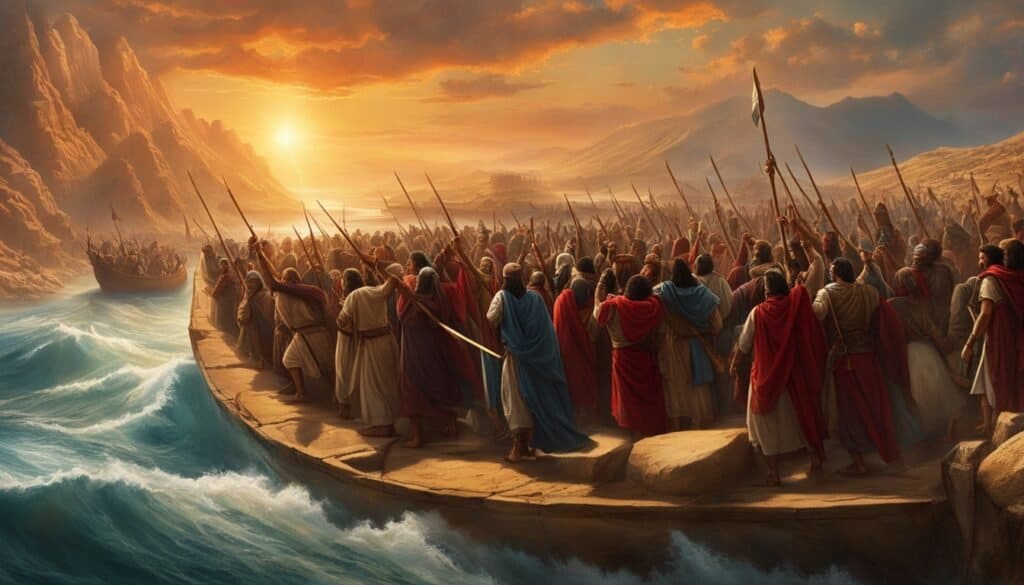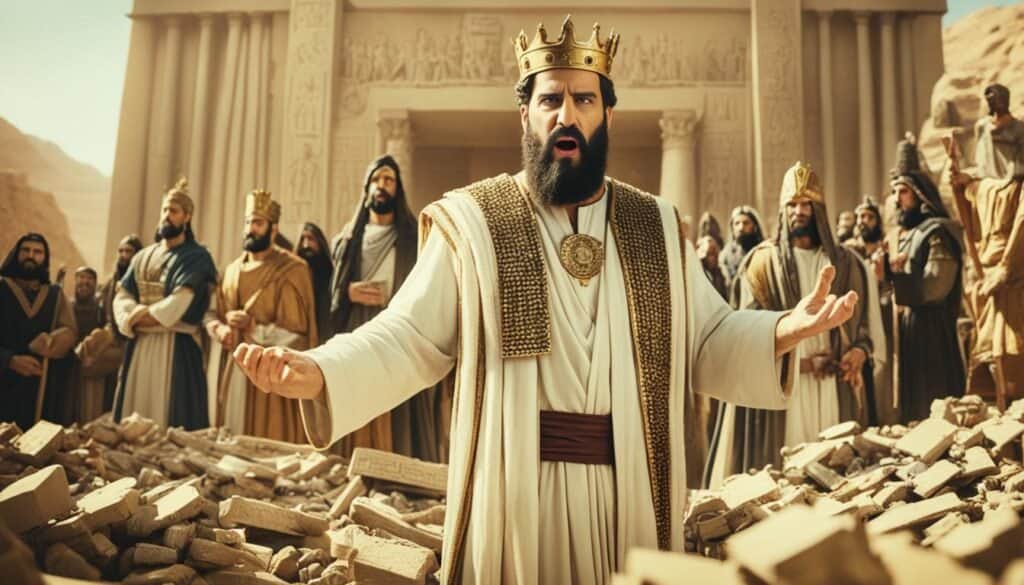What makes the greatest leaders and kings in history stand out? Their stories teach us about leadership and faith. We see how Moses and Jesus Christ, the King of Kings, led with patience, faith, and wisdom.
These leaders faced big challenges but kept their faith strong. Their stories teach us about leadership and faith. They show us how to be patient and wise, just like in the Bible.
We can learn a lot from their lives. They showed us what it means to lead with faith and purpose. By studying their stories, we can grow in our faith and leadership skills. For more on how biblical figures showed resilience, check out this insightful article.
Key Takeaways
- The legacy of biblical leaders teaches us about moral integrity and resilience.
- Patience and perseverance are crucial traits in the journey of faith.
- Moses and Jesus exemplify the transformative power of leadership.
- Each king faced unique challenges that shaped their character and reign.
- Understanding their stories can inspire us to cultivate our leadership qualities.
Introduction to Biblical Leaders
Leaders play a big role in shaping communities and guiding generations. In the Bible, we see how leaders helped with spiritual growth and social order. These figures were chosen by God for important missions, showing us the value of leaders in the Bible.
Leaders like Moses, David, and Esther showed us what it means to have faith, resilience, courage, and compassion. Their stories teach us how to face big challenges with faith in God’s promises. We learn from prophets, judges, and kings about leadership qualities that still matter today.
Looking at their lives, we see how they were hospitable, generous, forgiving, and had a vision for a better future. For example, the Patriarchs showed us what it means to have strong character. We can learn more about their traits here.
Their stories not only tell us about the past but also help us grow personally. By learning from their stories, we can develop leadership qualities in our own lives.
| Leadership Quality | Biblical Example | Application Today |
|---|---|---|
| Faith | Abraham | Trusting in a higher purpose |
| Resilience | Joseph | Overcoming adversity |
| Compassion | Ruth | Providing support to others |
| Forgiveness | David | Letting go of past grievances |
Significant Leaders: Moses and Joshua
Moses is a key figure in the Bible. He started his journey with a powerful meeting with God. This meeting showed how spiritual leaders can change lives.
He led the Israelites out of slavery in Egypt. Moses showed great moral strength and dedication to God’s plans.
Moses: The Deliverer of Israel
Moses freed the Israelites from slavery, a huge achievement. He also guided them through the wilderness, gave them laws, and kept their faith strong. Leading them was tough, but Moses showed great faith and resilience.
His story inspires leaders to be honest and have a clear purpose.
Lessons from Exodus 3:10
In Exodus 3:10, God asked Moses to lead the Israelites out of Egypt. Moses was hesitant at first, showing how new leaders might feel unsure. But he trusted God and took the leadership role he was meant for.
This story teaches us about faith and obedience. It shows the bravery Moses had to fulfill God’s call.
The Role of Joshua: The Conqueror of Canaan
After Moses, Joshua led the Israelites into the Promised Land. He was known for his military skills and strong faith in God. Joshua inspired and led the people well.
He made sure the people knew they were following God’s plan. Joshua’s leadership led to great victories that helped future generations.

King Saul: The First King of Israel
King Saul was a key figure in Israel’s history. He became the first king, changing Israel from a group of tribes to a monarchy. His anointing by Samuel meant a new leader and high hopes for a united kingdom.
Saul’s Anointing and Leadership
The anointing of Saul was a big moment. Samuel, with God’s guidance, poured oil on Saul’s head, showing God’s choice. This made Saul the first king of Israel, giving him big duties.
At first, Saul led well, winning battles and bringing the tribes together. His early success showed he could be a great leader.
Understanding 1 Samuel 15:11
But Saul’s rule had its problems, especially in 1 Samuel 15:11. God said He regretted choosing Saul because he didn’t follow God’s orders. This event shows what happens when leaders disobey.
As leaders, we must stay true to our call and follow God’s guidance. Saul’s mistakes teach us to be careful in our roles of power.
King David: The Shepherd King
King David’s story is a powerful tale of faith and divine purpose. He started as a humble shepherd but became a great leader with God’s help. His anointing by Samuel was the start of a journey filled with trust in God’s plan.
The Anointing of David
Choosing David as king showed his deep bond with God. The anointing happened in front of his brothers, who didn’t know God had chosen him. Samuel saw David’s potential and set him on a path of both challenges and victories.
David’s story teaches us about facing trials with faith and resilience. His journey is like those of other biblical leaders who overcame big challenges. For more on these themes, check out stories of leaders like Noah, Abraham, and Jacob in their epic journeys.
Exploring 2 Samuel 7:16
In 2 Samuel 7:16, God promises to make David’s dynasty last forever. This shows how important David is in the Bible and how God keeps his promises. Leaders can find comfort in God’s promises, just like David did.
Understanding our unique paths and God’s guidance is key. Just as David did, we’re called to follow our own paths and trust in God’s promises.

King Solomon: The Wise Ruler
King Solomon is a key figure in the Bible, known for his wisdom and wealth. He chose to ask for wisdom over wealth, showing us the value of knowledge. By looking into 1 Kings 3:5-14, we can learn a lot from his wise decisions.
Wisdom and Riches in 1 Kings 3:5-14
King Solomon met with God and asked for wisdom instead of riches or a long life. God agreed, showing that true wisdom leads to prosperity for both individuals and nations. Solomon’s choice teaches us that seeking knowledge can lead to great rewards, making him a smart leader and understanding the needs of his people.
His rule was successful because of this wisdom. Here are some ways it showed:
| Attributes | Impact |
|---|---|
| Wisdom | Enabled effective decision-making and governance |
| Riches | Enhanced economic stability and growth |
| Peace | Fostered a culture of stability among nations |
Solomon’s Legacy in Ecclesiastes 1:1
In Ecclesiastes, King Solomon shares his thoughts on life, showing his wisdom. Through Ecclesiastes 1:1, we see his deep insights into human life and the search for meaning. Solomon urges us to think about our purpose and understanding, leaving a lasting mark on the Bible.

King Hezekiah: The Reformer
King Hezekiah was a key figure in biblical history. He made big changes to bring true worship back to Israel. Despite many challenges, his strong faith set a high standard for leaders. His faith showed how one person’s belief can lead a whole nation back to its spiritual roots.
Trust and Faith in 2 Kings 18:5
In 2 Kings 18:5, we see Hezekiah’s deep faith and commitment to God. He worked hard to stop idol worship and bring back the worship of Yahweh. His efforts deeply moved the people of Israel, making them trust God more during hard times.
Thinking about Hezekiah’s faith reminds us of the bravery needed to stick to our beliefs, even when it’s hard. His story encourages us to stay strong in our beliefs. Like Hezekiah, we can build a community based on faith and trust.

Hezekiah’s rule shows the strength of reformative leadership. He made changes that matched his faith, which brought new life to Israel’s spiritual life. For more on faith in leadership, check out the Divine Blueprint. It talks about God’s detailed plan in the Bible.
| Aspect | Hezekiah’s Focus | Impact on Israel |
|---|---|---|
| Worship Practices | Restoration of true worship | Increased faithfulness among the people |
| Idolatry | Elimination of pagan idols | Reestablishment of monotheism |
| Leadership Style | Servant leadership | Encouraged community involvement |
In summary, King Hezekiah’s story teaches us about the power of faith-driven change. His leadership shows how trusting in God can lead to big changes. As we go through life, let’s be inspired by Hezekiah’s faith to make a positive impact on our communities.
Young Kings: Josiah and His Reformation
King Josiah’s story is a powerful example of a young leader with deep faith. Despite his young age, he led his people back to true worship. He started his reign at just 8 years old, showing us the impact of youthful leadership.
Josiah’s Faithfulness to God
Josiah’s faithfulness teaches us about our own commitment to our beliefs. He worked hard to restore the temple and celebrate the Passover. This shows his deep understanding of God’s covenant with His people.
It’s a lesson for young leaders today. It encourages us to take our roles seriously, no matter our age.
Impact of 2 Chronicles 34:19
In 2 Chronicles 34:19, we see a key moment in Josiah’s reign. The discovery of the Book of the Law led to deep repentance and reforms in Judah. This event highlights the power of scripture and the need for leaders to be grounded in biblical truth.
We can learn from Josiah’s example. Real change starts with a true heart seeking God.
Influential Rulers from Other Nations
History has seen many rulers change the world. Nebuchadnezzar II and Cyrus the Great are two who stand out. They teach us about leadership and the balance of power.
Nebuchadnezzar II: The Babylonian King
Nebuchadnezzar II was a famous Babylonian king. He was known for his great conquests and the beauty of Babylon. He built the Hanging Gardens, one of the Seven Wonders of the Ancient World.
Despite his success, he faced a hard lesson. His pride led to a humbling experience. This teaches us about the dangers of being too proud and the power of God over all rulers.
Cyrus the Great: The Persian King
Cyrus the Great was a kind and wise Persian king. He let the Jewish exiles go back to Jerusalem. This shows his respect for different cultures and faiths.
His act of mercy shows how one ruler can greatly affect another’s people. Cyrus’s leadership is a lesson in using power for good and following a higher purpose.
Leaders and Kings: A Study of Their Impact
In looking at the impact of biblical leaders, we see themes that echo through history. Their lives teach us valuable leadership lessons from the Bible. These lessons guide our actions and decisions today. Figures like Moses, David, and Solomon show us how to lead with faith, bravery, and wisdom.
Leadership is more than just being in charge. It’s about serving with purpose. Each leader faced big challenges that tested their character. Yet, their reactions show us the integrity and commitment needed to lead well.
The story of Moses freeing the Israelites from slavery shows how faith can change lives and nations. Events like these teach us the power of belief and prayer, as seen in answered prayers in Genesis.
To make our point clear, here’s a table with key leaders, their actions, and what we can learn from them:
| Leader | Defining Actions | Leadership Lessons |
|---|---|---|
| Moses | Leading the Exodus | Courage in the face of oppression |
| David | Defeating Goliath | Faith can overcome immense obstacles |
| Solomon | Building the Temple | The importance of wisdom in leadership |
Looking at the legacy of kings, we see key traits for good leadership. These include faith, adapting to change, and finding strength in community. By reflecting on their stories, we aim to live these principles in our lives. This builds a community of leaders inspired by the leadership lessons from the Bible.
How Do the Trials of Job Reflect Leadership Qualities Found in Kings of the Bible?
The trials of Job exemplify unwavering commitment, a quality mirrored in the kings of the Bible. Job’s faith journey showcases resilience in the face of adversity, highlighting the importance of righteousness and perseverance. These leadership traits inspire others to lead with integrity, fostering strength amid challenges faced by rulers and followers alike.
Jesus Christ: The King of Kings
In our journey through the exploration of leadership in a biblical context, we find that Jesus Christ stands as the ultimate model of messianic leadership. His authority is clear in passages like Matthew 27:11 and Revelation 19:16. He reigns with power, yet shows deep humility and love. His life and teachings guide us to serve others and show what true leadership looks like.
Seeing Jesus as the King of Kings makes us think about our leadership roles in our communities. His love and sacrifice show us how to lead. By focusing on serving and showing compassion, we can make a positive difference and spread hope. Jesus Christ’s impact shows how a faithful leader can change the world.
The stories of faithful people in the Book of Genesis connect with Jesus’s teachings. Abraham, Jacob, and Joseph show us the importance of being steadfast. For more on faithfulness, check out the amazing lessons in Genesis. Following their example of loyalty, trust, and moral values helps us honor our King of Kings.
Affiliate Disclosure: "As an Amazon Associate I earn from qualifying purchases made from links in this post. We are a participant in the Amazon Services LLC Associates Program, an affiliate advertising program designed to provide a means for us to earn fees by linking to Amazon.com."

